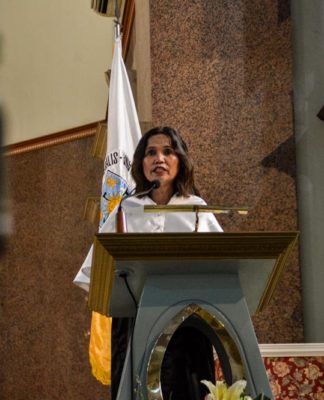“AUTHENTIC human development is the fruit of charity propelled in truth.”
This is the central message of Pope Benedict XVI’s latest encyclical, Caritas in Veritate (Charity in Truth), which is the Pope’s third encyclical, but his first “social” doctrine.
Caritas in Veritate was inspired by Pope Paul VI’s Populorum Progressio as it made use of Populorum Progressio’s message of human development needing to be holistic for it to be authentic. However, Caritas in Veritate related this message to the current global economic crisis.
Pope Benedict XVI reiterated the Populorum Progressio’s previous message of every individual (and humanity as a whole) being important. He echoed Pope Paul VI’s message of recognizing the importance of travelling the path of development using the mind and the heart.
“(Caritas in Veritate) will highlight what for Christians are the objectives to pursue and the values to promote and to defend tirelessly, if we are to achieve a truly free and supportive human coexistence,” the Pope stated in his Address to the members of the Centisimus Annus- Pro Pontifice Foundation last June 13.
The Supreme Pontiff also stressed in his encyclical that resources will never run out, but scarcity remains because of an ‘imbalance’ in the distribution of resources.
“The world’s wealth is growing in absolute terms but inequalities are on the increase,” the Pope said. “In rich countries, new sectors of society are succumbing to poverty and new forms of poverty are emerging.”
He attributed this situation to what he mentions as “the scandal of glaring inequalities,” which continuously plagues today’s society.
“Corruption and illegality are unfortunately evident in the conduct of the economic and political class in rich countries,” the Pope said. “Among those who fail to respect the human rights of workers are large multinational companies as well as local producers.”
However, despite its negative aspects, economic activity is still not to be considered intrinsically evil. Being a human activity, it is how people use it that determines whether it is good or evil.
“Economic activity is simply not a machinery to create wealth. The Church’s social doctrine has always maintained that justice must be applied to every phase of economic activity, because this is always concerned with man and his needs,” the Pope said.
He added that globalization, the so-called and perceived worldwide economic interdependence, can open up the possibility of large-scale redistribution of wealth, which is perceived as a possible response to issues such as poverty, problems on economic aid and even on responsible procreation, if used positively.
He stated that if globalization is used improperly, it can lead to more poverty and inequality that could trigger a global crisis.
“It will be what people make of it,” the Pope said.
According to Fr. Philip Francis Bersabe, Master’s degree holder in Sacred Theology (major in Dogmatic Theology), the Pope finds interconnectedness in the five nouns—God, charity, hope, salvation, and now, truth.
Bersabe was a guest speaker in the seminar Caritas in Veritate: An aperitif held by the Faculty of Sacred Theology last September 3.
Bersabe pointed out the positive and negative aspects of globalization. While it creates a sense of solidarity, we are on the brink of losing our individual identity, he added.
“There is much technological progress, but there is much moral regress,” Bersabe said, explaining further what Christians need to do.
“We must promote a culture of life and establish a civilization of love,” he said, as the pursuit of the common good as a requirement of justice and charity is the Pope’s advocacy in Caritas in Veritate.
According to the Holy Father, nature expresses a design of love and truth, and it tells us of God. We must then have a responsibility not only to the environment but also to people who are part of nature.
The Pope also called for the cooperation of the human family, stating that human development does not only focus on heavy societal and economical issues.
Bersabe echoed the Pope’s message, adding that human family is very important since it is the “first school of integral human development.“
“Not to respect life is not to respect any right at all,” he explained.
According to Bersabe, the Church does not offer technical solutions for the global economic crisis. Instead, the Pope goes into the root cause of the crisis – greed.
“The encyclical offers to bring back the world’s attention to God, who is the absolute truth and eternal love,” Bersabe said.
Recalling the Church’s doctrines
According to Fr. Fausto Gomez, O.P., regent of the College of Rehabilitation Sciences, though it recalls Pope Paul VI’s social encyclical, Caritas in Veritate is a new interpretation written in today’s context.
“Caritas tells us to be aware of the situation of the world and how we could contribute to it,” Gomez said.
Caritas in Veritate pays tribute to the 40th year of Pope Paul VI’s Populorum Progressio, stating Paul’s conviction that Populorum Progressio deserves to be considered as the Rerum Novarum in the present age, as it sheds light upon humanity’s journey toward unity.
Though Caritas in Veritate is the Pope’s first encyclical based on the social doctrines of the Church, it remains interconnected with his previous two—Deus Caritas Est (God is Love) and Spe Salvi (Saved in Hope).
A letter to Thomasians
The word “encyclical” (derived from the Greek word en kyklo meaning general or encircling) is a letter addressed to all. Though the content seemed complicated for lay people to read, it should not deter anyone from reading it and understanding its contents, said Bersabe.
“To understand the encyclical, lay people can start by reading commentaries online. However, this cannot fully substitute reading the whole encyclical,” Bersabe pointed. The Church then, plays a big role to impart the contents of the encyclical to its flock.
“The teachings of the Church ought to be contextualized,” he said.
Bersabe gave other suggestions as to how people can understand encyclicals. Students may seek counsel from the priests, and by highlighting its practical aspects, varied advocacies can be pursued to put the letter into practice. Forums and round table discussion on how to respond to the Pope’s call can also be done.
“The Supreme Pontiff’s letter is also a sign of God’s unending grace to the Thomasian community,” Bersabe said.
With the University nearing its quadricentennial year, the Pope’s message is indeed timely for Thomasians who are challenged to participate in the advocacy of the Pope—integral human development.
The content of the encyclical is also similar to the Thomasian Code of Honor, wherein concepts of truth, justice, and compassion can be found in both. In addition, the Dominican motto, veritas, fits very well with the encyclical’s theme.
Finally, Bersabe said that Thomasians can respond to the Pope’s letter through practicing its message of “charity in truth.”
Quoting from Paul Ricoeur, a French philosopher, Bersabe summarized the point of the encyclical, “every good act that you do, diminishes the evil in this world, and every evil act that you do contributes to the evil in this world.” Camille Abigael P. Alcantara and Robin G. Padilla















